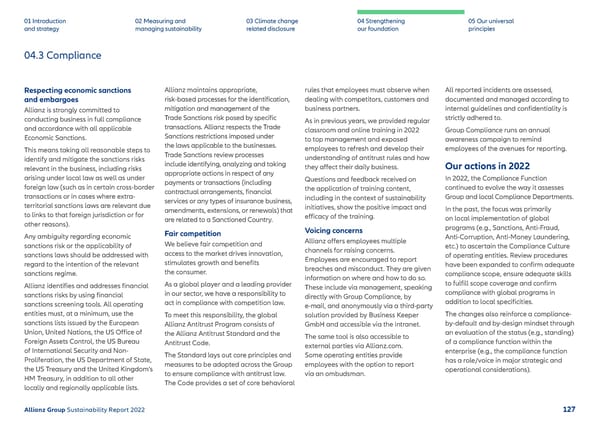01 Introduction and strategy 02 Measuring and managing sustainability 03 Climate change related disclosure 04 Strengthening our foundation 05 Our universal principles Respecting economic sanctions and embargoes Allianz is strongly committed to conducting business in full compliance and accordance with all applicable Economic Sanctions. This means taking all reasonable steps to identify and mitigate the sanctions risks relevant in the business, including risks arising under local law as well as under foreign law (such as in certain cross-border transactions or in cases where extra- territorial sanctions laws are relevant due to links to that foreign jurisdiction or for other reasons). Any ambiguity regarding economic sanctions risk or the applicability of sanctions laws should be addressed with regard to the intention of the relevant sanctions regime. Allianz identifies and addresses financial sanctions risks by using financial sanctions screening tools. All operating entities must, at a minimum, use the sanctions lists issued by the European Union, United Nations, the US Office of Foreign Assets Control, the US Bureau of International Security and Non- Proliferation, the US Department of State, the US Treasury and the United Kingdom’s HM Treasury, in addition to all other locally and regionally applicable lists. Allianz maintains appropriate, risk-based processes for the identification, mitigation and management of the Trade Sanctions risk posed by specific transactions. Allianz respects the Trade Sanctions restrictions imposed under the laws applicable to the businesses. Trade Sanctions review processes include identifying, analyzing and taking appropriate actions in respect of any payments or transactions (including contractual arrangements, financial services or any types of insurance business, amendments, extensions, or renewals) that are related to a Sanctioned Country. Fair competition We believe fair competition and access to the market drives innovation, stimulates growth and benefits the consumer. As a global player and a leading provider in our sector, we have a responsibility to act in compliance with competition law. To meet this responsibility, the global Allianz Antitrust Program consists of the Allianz Antitrust Standard and the Antitrust Code. The Standard lays out core principles and measures to be adopted across the Group to ensure compliance with antitrust law. The Code provides a set of core behavioral rules that employees must observe when dealing with competitors, customers and business partners. As in previous years, we provided regular classroom and online training in 2022 to top management and exposed employees to refresh and develop their understanding of antitrust rules and how they affect their daily business. Questions and feedback received on the application of training content, including in the context of sustainability initiatives, show the positive impact and efficacy of the training. Voicing concerns Allianz offers employees multiple channels for raising concerns. Employees are encouraged to report breaches and misconduct. They are given information on where and how to do so. These include via management, speaking directly with Group Compliance, by e-mail, and anonymously via a third-party solution provided by Business Keeper GmbH and accessible via the intranet. The same tool is also accessible to external parties via Allianz.com . Some operating entities provide employees with the option to report via an ombudsman. All reported incidents are assessed, documented and managed according to internal guidelines and confidentiality is strictly adhered to. Group Compliance runs an annual awareness campaign to remind employees of the avenues for reporting. Our actions in 2022 In 2022, the Compliance Function continued to evolve the way it assesses Group and local Compliance Departments. In the past, the focus was primarily on local implementation of global programs (e.g., Sanctions, Anti-Fraud, Anti-Corruption, Anti-Money Laundering, etc.) to ascertain the Compliance Culture of operating entities. Review procedures have been expanded to confirm adequate compliance scope, ensure adequate skills to fulfill scope coverage and confirm compliance with global programs in addition to local specificities. The changes also reinforce a compliance- by-default and by-design mindset through an evaluation of the status (e.g., standing) of a compliance function within the enterprise (e.g., the compliance function has a role/voice in major strategic and operational considerations). 04.3 Compliance Allianz Group Sustainability Report 2022 127
 Sustainability Report 2022 | Allianz Page 127 Page 129
Sustainability Report 2022 | Allianz Page 127 Page 129